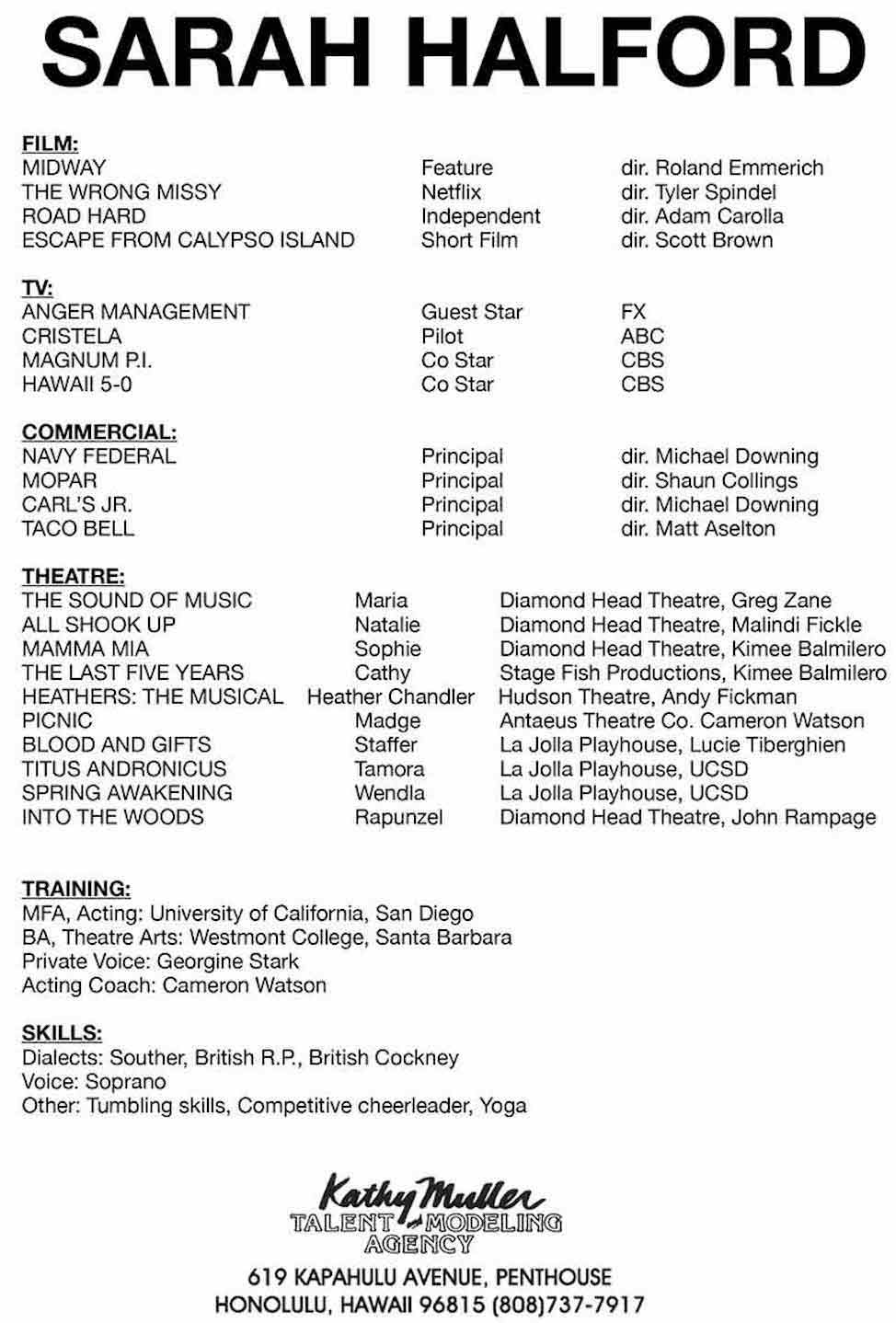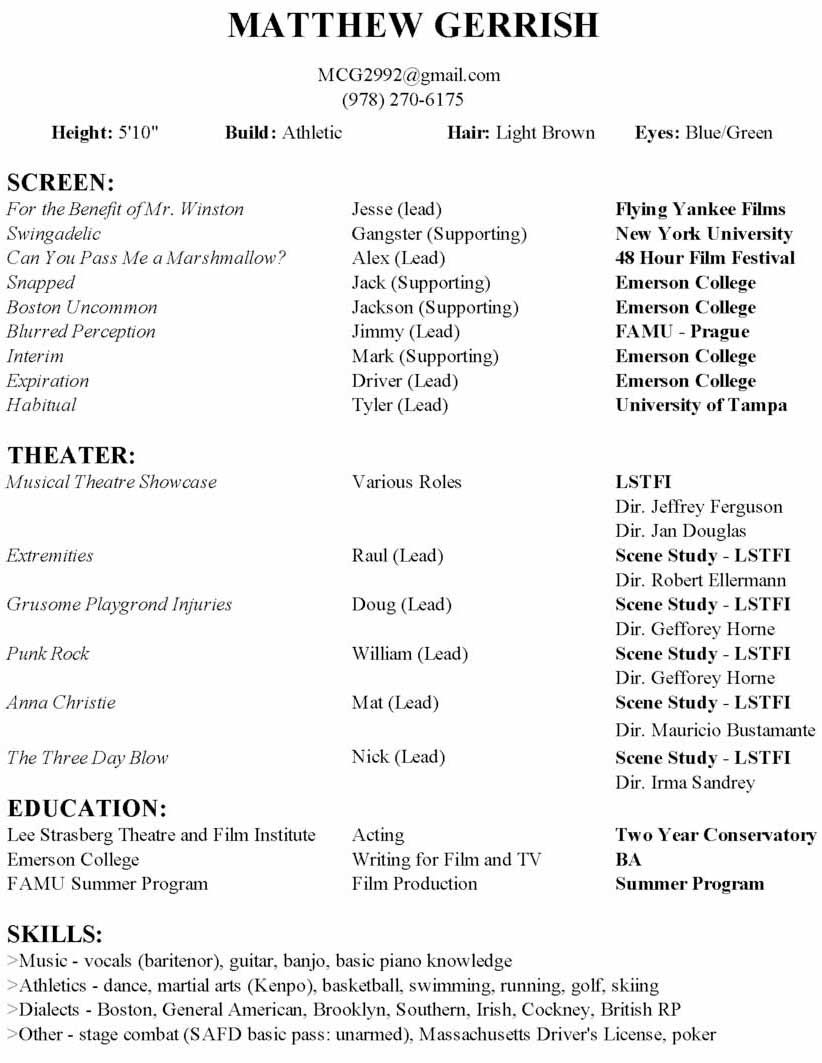While acting can often seem like one of the more glamorous aspects of filmmaking, the truth is, it’s first and foremost a job.
All jobs require interview and vetting processes and a resume can play an instrumental part in introducing you to the right people and eventually landing some work.
Like any standout CV, an acting resume is a one-page document that competently describes a performer’s acting experience and skill set (as it’s relevant to acting).
You only get one opportunity to make a first impression and a resume is your big shot at an introduction to a potential employer. Whether it’s an agent, casting director, studio executive, producer or director reading over your work and experience history, it’s important to make this one count.
You don’t always need an acting resume for an acting audition, because oftentimes your representatives will be speaking with casting directors to secure you auditions and work. However, having a resume never hurts, especially when you’re independently applying to roles that require one.
It’s a great way to give someone looking to make a hire a quick snapshot into you and your work history and industry experience.
So let’s break down the components of the CV to drill down on some of the basic ideas you’ll want to include in your acting resume…
Before you dive into your background and relevant experiences and skills, you’ll want to select an acting resume template (a number of which can be found here). While there are several templates to choose from, what’s crucial here is ensuring that the information you want to convey comes across cleanly and clearly.
Resumes aren’t the time to be cute and clever. This is where you need to deliver your essential information as quickly and lucidly as possible to your reader. Don’t waste time on fancy wording or unnecessary descriptions. Like being on stage, you want to grab your audience’s attention as quickly as possible. So choose a format that suits you, but also be sure that all the information you’d like to express is lucid. professional, and clearly presented.
Always use basic fonts that are readable and clear. Even though there are so many varied fonts to choose from, this is a situation where simpler is always going to work out better. Keep your letters plain and readable. The last thing you want is someone squinting at your words, trying to decipher what they are.
We understand that color can be tempting and potentially eye-catching, but it also screams amateurishness. Professionalism is essential when it comes to building a resume, so avoid the temptation to be flamboyant and flashy on your resume. Black letters on a white background are the easiest to read and the fastest way to reach your reader.
This means using three columns to organize and display your information (this should be evidenced in several of the resume templates linked above). Typically these columns are divided into: (1) name of the production, (2) the role you played in the show, (3) where the work was showcased (whether that’s a film studio, TV network or streamer, or playhouse).
This one sounds a little strange. But it’s true. Ideally, you want your black on white words to pop off the page and catch your reader’s eye. The most effective way to do this is make sure the black letters have enough white space around them to really grab your reader.
This is another one that gives some people pause. But the truth is, agents, casting directors, executives, producers and directors don’t have the time to go through every resume with a fine tooth comb. Even if you have experience that brings you to two (or even three!) pages, be judicious and make sure your resume keeps your most impressive and note-worthy work and experiences all on a single page.
Your personal information includes your name, contact information (phone number and/or email address), and any union affiliations you may have (if you don’t have any union affiliations such as SAG or AFTRA, don’t worry about it; everyone started somewhere without any union memberships. You’ll get there.).
Personal information also includes your overall look and physical features. In this section, you’ll list your height, weight, eye color, hair color, body type and any other physical characteristic that may stand out and make you a unique candidate for roles.
Your agent and manager’s contact information (if you have them) should also be included in this section. Confer with your representatives to see if you should offer contacts for both yourself and them, as oftentimes agents and managers would prefer all potential work correspondence to always go through them before it reaches their clients (read: you).
This is the nuts and bolts of your resume. It’s where you list the work you’ve done and are given a chance to shine by not only displaying the production you performed in, but also potentially offering up a recognizable title. And speaking of recognizable titles, it’s best to put your most potentially known work at the top. Let the first thing the reader sees be something that grabs them immediately.
Acting experience on a resume should date back a maximum of ten years. That includes work in theater, television and film. Any further than that, and things will start to feel dated.
“You’ll want to separate each genre: Television, Film, Theater, Education, Training. Special Skills, etc. If you’re just starting out, and don’t have any television or film credits yet, then adding any recent theater roles you played is a good place to start.” –
Wendy Braun (Atypical, This Is Us, It’s Always Sunny in Philadelphia)
A lot of people wonder if they should include extra and background roles on their acting resume. While extra work can give you some terrific stories to tell and put you in the same space as some renowned actors, directors and producers, Braun strongly recommends keeping them off professional resumes. She explains, “It’s better to list great training and theater than a long list of extra work.”
In this section, everything that you’ve done as far as training and educating yourself counts. Whether it’s a four-year college degree or a six-week workshop or a one-day seminar, include it all. You want to showcase the discipline and schooling you’ve worked through in order to better yourself as an actor. And as a side note, the more diverse the schooling and training, the better. A broader range an actor can perform in, the more you increase your chances of landing diverse work.
You know you’ve got them. Now you just need to share them with the world. Whatever unique skills or abilities you can showcase on your resume, this is the section to do so.
Do you speak multiple languages? Can you perform in different accents? Are you a dancer? An acrobat? An athlete (if so, tell us the specific sport)? A martial artist? Do you sing (if you do, indicate your range, e.g. High D or Tenor)?
Listing out the abilities, talents and experience that makes you unique, allows this portion of your resume to be the ideal place in helping you stand out in a crowd. And considering the high level of competition in the Industry (specifically acting), you’ll want to take every opportunity you can to showcase any of your noteworthy and special skills.
Here’s the space to toot your horn and talk about your acting-related accomplishments and victories. Mention the name of the competition, the year you participated, and your specific placement within it.
Resumes should always be kept on hand and up to date. By “on hand” we’re talking hard copies. You never know when you’ll have an opportunity to pitch yourself to a potential employer. So keep copies around and easily accessible.
Because you’ll ideally be constantly updating your headshot, it’s a good idea to print your resume on a separate piece of paper (as opposed to printing it directly on the back of your headshot). This way, you can easily affix the updated version of your resume to your headshot. Otherwise, you’ll have to reprint everything with each new job you get! Don’t use glue or paperclips to attach your resume to your headshot; glue can get messy and paperclips tend to snag and catch on things they’re not supposed to.
Here’s an important one, but it’s something that should be included in this discussion and that’s to remember to always tell the truth on your resume (you’d be surprised how often this rule gets ignored).
Aside from the obvious issue of being immoral, getting caught in a lie on your resume (whether it be for a job you got, an award you won, or even an education you may have received) will more than likely destroy any shot you’d have at the gig, and further, could seriously affect your reputation.
Here are a couple of acting resumes we really like. Notice how they’re neatly organized, with separate sections for different types of credits, education, and special skills. You’ll also notice that these resumes include different info sections and have different formats. That’s great! You’re not a cookie-cutter Actor, and your resume shouldn’t be, either.

Courtesy of Sarah Halford.

Courtesy of Matthew Gerrish.



